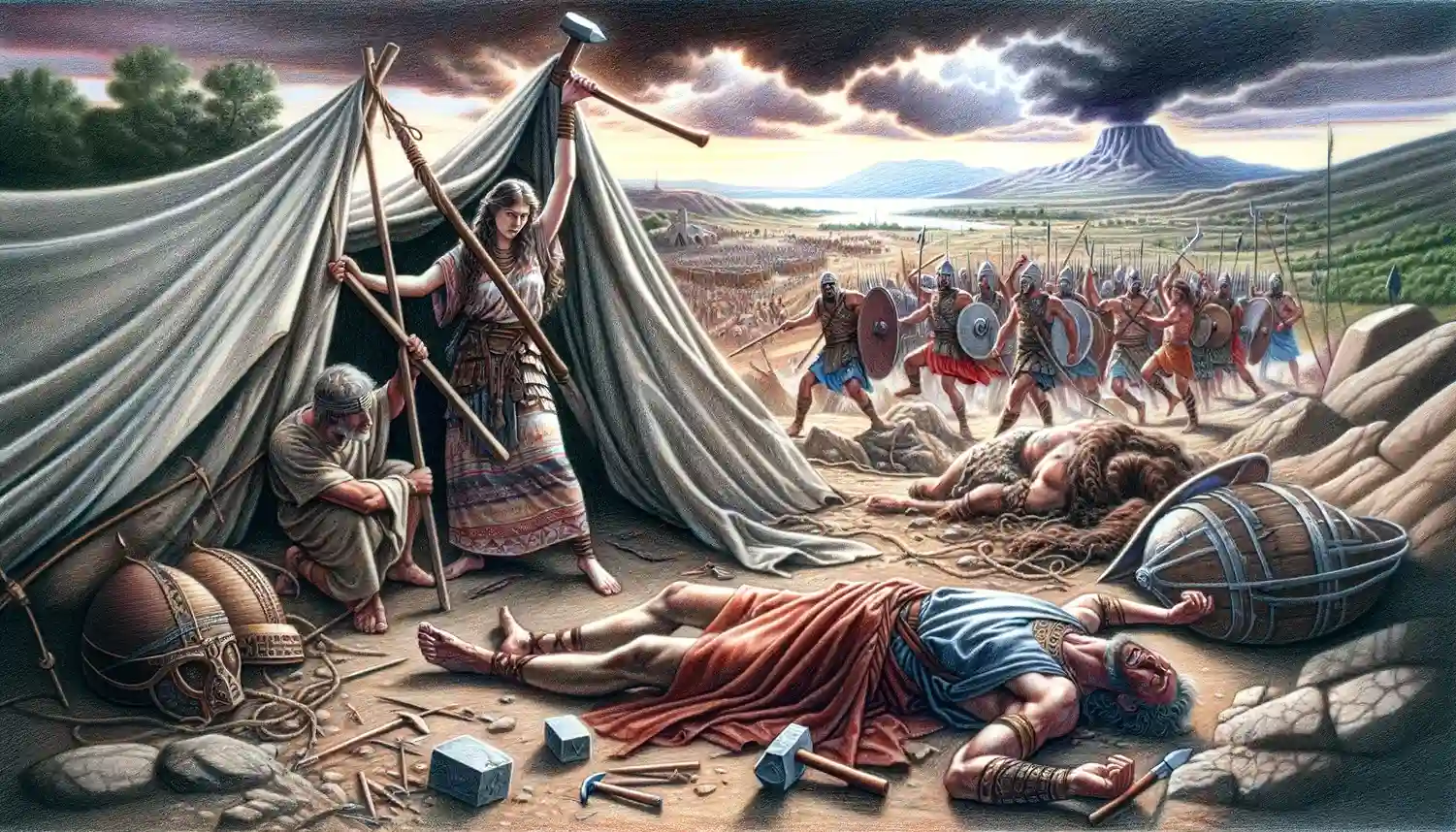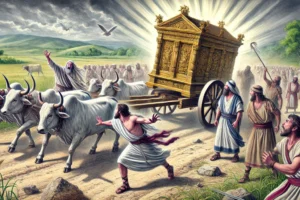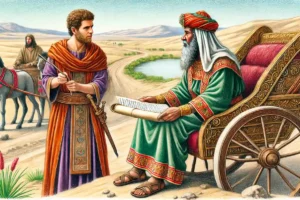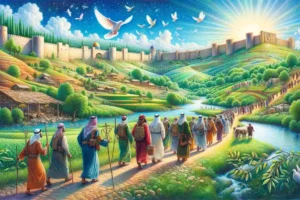
The Defeat of Sisera
The defeat of Sisera is a dramatic and pivotal event recorded in the Book of Judges, chapters 4 and 5. This story showcases the remarkable deliverance of Israel from Canaanite oppression through the leadership of Deborah, a prophetess and judge, and Barak, a military commander. It also features the courageous act of Jael, who played a crucial role in Sisera’s downfall. This event not only highlights the power of divine intervention but also underscores the themes of justice and deliverance in Israel’s history.
Quick Facts about the Defeat of Sisera:
- Background: The defeat of Sisera is recorded in Judges 4-5. Sisera was the commander of the Canaanite army under King Jabin of Hazor.
- Oppression: The Israelites were oppressed by King Jabin for twenty years, prompting them to cry out to the Lord for help.
- Deborah and Barak: Deborah, a prophetess and judge of Israel, instructed Barak to gather an army and fight Sisera. Barak agreed on the condition that Deborah would accompany him.
- Battle: Barak led 10,000 men from the tribes of Naphtali and Zebulun to Mount Tabor. Sisera responded by mobilizing his 900 iron chariots and troops to the Kishon River.
- Divine Intervention: The Lord caused confusion in Sisera’s army, leading to their defeat. The Canaanite forces were thrown into disarray, and many were killed by the Israelites.
- Sisera’s Escape: Sisera fled the battlefield on foot and sought refuge in the tent of Jael, the wife of Heber the Kenite.
- Jael’s Act: Jael offered Sisera milk and a place to rest. While he slept, she drove a tent peg through his temple, killing him.
- Victory Song: Deborah and Barak sang a song of victory, celebrating the defeat of Sisera and praising God for delivering Israel from oppression.
- Peace: The defeat of Sisera led to forty years of peace for Israel.
The defeat of Sisera, as described in Judges 4-5, is a compelling narrative that highlights God’s deliverance of Israel through unlikely heroes and divine intervention. This event is rich in theological significance, symbolism, and historical context.
Biblical Context and Historical Background
The Book of Judges chronicles a period in Israel’s history characterized by cycles of sin, oppression, repentance, and deliverance. After the death of Joshua, Israel frequently fell into idolatry and was oppressed by neighboring nations as a consequence. In this context, the Israelites were subjected to King Jabin of Hazor and his military commander Sisera, who oppressed them for twenty years with a formidable army that included 900 iron chariots.
Key Characters
- Deborah: A prophetess and judge, Deborah stands out as a key figure due to her leadership and spiritual authority. She held court under a palm tree and provided guidance to the people of Israel.
- Barak: The military leader chosen by God, Barak was tasked with leading Israel’s army against Sisera. His initial hesitance and insistence on Deborah’s presence highlight his reliance on her prophetic insight.
- Jael: The wife of Heber the Kenite, Jael played a decisive role in Sisera’s defeat. Her actions underscore the theme of God’s deliverance through unexpected means.
The Battle and Divine Intervention
Preparation for Battle: At Deborah’s command, Barak assembled 10,000 men from the tribes of Naphtali and Zebulun at Mount Tabor. Sisera, confident in his technological advantage with iron chariots, mobilized his forces to the Kishon River.
Divine Confusion and Victory: Judges 4:15 states that the Lord threw Sisera’s army into confusion. While the text does not detail the exact means, Judges 5:20-21 provides additional insight, suggesting a supernatural storm (“From the heavens the stars fought, from their courses they fought against Sisera. The river Kishon swept them away”). The heavy rain likely caused the Kishon River to flood, rendering Sisera’s chariots ineffective and leading to a rout.
Sisera’s Escape and Jael’s Role
Sisera’s Flight: After his army’s defeat, Sisera fled on foot to the tent of Jael. He likely sought refuge there due to the neutrality of the Kenites, a clan that had peaceful relations with King Jabin.
Jael’s Act of Valor: Jael welcomed Sisera and offered him hospitality. Once he was asleep, Jael took a tent peg and a hammer and drove the peg through his temple, killing him. This act was both daring and unexpected, emphasizing the theme of God’s deliverance through unconventional means.
Theological Themes
- Divine Sovereignty: The narrative underscores God’s control over history and His ability to deliver His people through unexpected instruments, such as a prophetess, a hesitant military leader, and a seemingly insignificant woman.
- Role of Women: Deborah and Jael’s pivotal roles challenge traditional gender norms of the time and highlight God’s use of all individuals, regardless of gender, to achieve His purposes.
- Judgment and Deliverance: The defeat of Sisera is a microcosm of the larger theme in Judges—God’s judgment against oppressors and deliverance of the repentant. It reassures the Israelites of God’s faithfulness despite their recurrent unfaithfulness.
Victory Song of Deborah and Barak
Judges 5 is a poetic retelling of the events in Judges 4, celebrating the victory over Sisera. This song is one of the oldest passages in the Bible and provides valuable insights into the period’s culture and theology. It praises God for His intervention, recounts the battle, and celebrates the courage of those who participated. The song also curses those who did not come to Israel’s aid, reinforcing the importance of unity and collective action in God’s deliverance.
Conclusion
The defeat of Sisera is a powerful story of deliverance, showcasing God’s sovereignty, the importance of faith and obedience, and the significant roles women played in Israel’s history. It serves as a reminder of God’s faithfulness and the unexpected ways He can bring about salvation. The narrative and its accompanying song highlight themes of divine justice, the triumph of good over evil, and the restoration of peace, resonating with the broader theological and moral lessons found throughout the Book of Judges.



